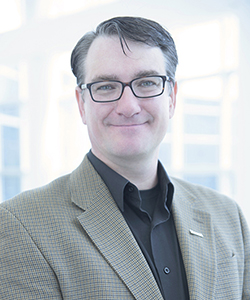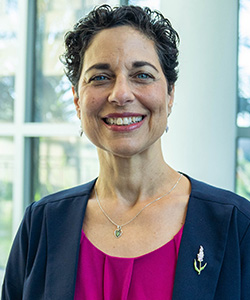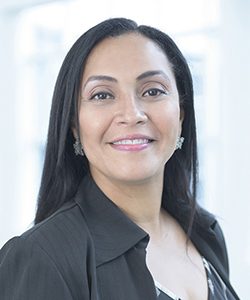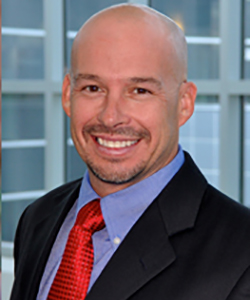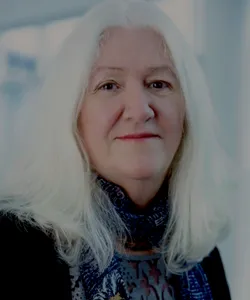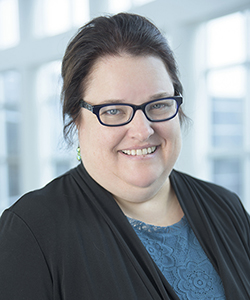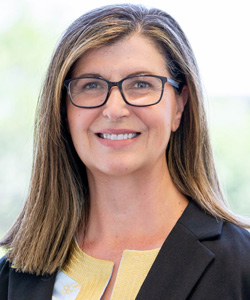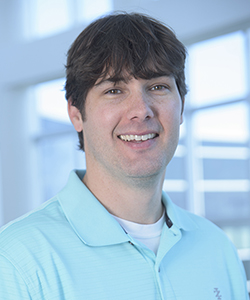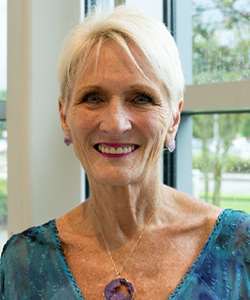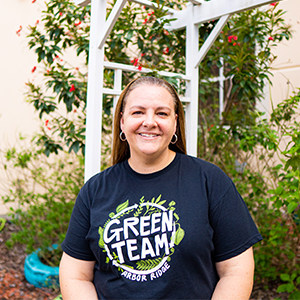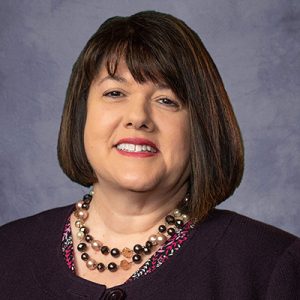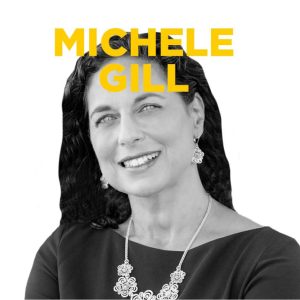UCF’s fully online Ed.D. in Curriculum & Instruction is designed for experienced professionals who want to create meaningful change in education, training and learning environments of all kinds — from PreK-12 schools and universities to the military, corporate sectors and nonprofit organizations.
This career-focused doctorate is built around real-world impact. From day one, you’ll be paired with a faculty mentor who will guide you through the program, your specialization of choice and your dissertation through regular meetings. With them, you’ll identify a complex problem unique to your specialization and profession, such as: Why do some students not graduate? Why are some students graduating but they can’t read? Why do some employees not take advantage of employee learning programs? Why can’t people learn to put a urinary catheter in correctly, even though we’ve given them all the information?
Over the course of the program, you’ll work to apply the theories you’re studying in class to refine the problem and develop solutions that can be implemented at your organization or used to advance your field.
While our program is fully online, you’ll be far from on your own. In addition to working with your mentor and expert faculty from across the university, you’ll learn alongside a supportive cohort model from across the nation, who you’ll meet with weekly during synchronized Zoom sessions.
As a result, you’ll graduate with the skills necessary to blend intellectual rigor with evidence-based knowledge to advance your career — and make a difference where it counts.
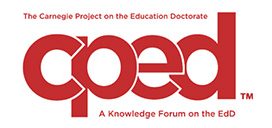
A Proud Member Institution of the Carnegie Project for the Education Doctorate
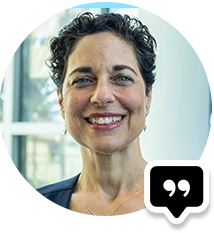
“We ask our students early on, ‘What kind of future career do you want? What experience do you want to gain that you don’t have already?’ And what I am so proud of about our program is that we really respond to the stated interests and goals of our students, in a highly individualized and caring way.”
Michele Gill
UCF Professor, Advisor of the EdD in Curriculum and Instruction Program
Read more about what Dr. Gill has to say about the EdD program and what makes it unique.
Areas of Specialization
Work alongside a team of faculty and field advisors to build expertise in your specialization of choice.
Gain a broad understanding of the factors affecting learning and approaches to addressing systemic problems.
Specialization Advisor
Mindfulness and Meditation in Education Signature Research Area
As a graduate student, you’re invited to collaborate and contribute to research on mindfulness and meditation in the classroom with like-minded peers. Our current studies are focused on the ways that meditation and mindfulness are evolving to better help students, especially with the use of technology such as virtual reality environments and artificial intelligence-driven apps. Connect with Assistant Professor Steven Haberlin for more information.
Explore the underlying psychological factors such as cognition, motivation and development, which affect learning and instruction to promote optimal human development. Skills developed during this program will allow you to teach educational psychology courses at the college level; consult on learning, development, and instruction; provide organizational training; conduct research; engage in online instruction; and improve learning environments in a variety of settings.
Sample Courses
- Lifespan Human Development
- Applied Learning and Instruction Seminar I
- Applied Learning and Instruction Seminar II
- Motivation in Learning and Performance
- Adult Learning
- Learning Theories Applied to Classroom Instruction and Management
- Human Intelligence
Specialization Advisor
Advance the field of language arts by diving deeper into the study of literacy, literature and diversity, and the role of language and writing in learning English.
Sample Courses
- Advanced Writing Workshop
- Advanced Studies in Adolescent Literature
- Trends in Language Arts Education
- Research in Teaching English
- Seminar in Language Arts Education
Specialization Advisor
Improve the understanding of, teaching of and outcomes for students with disabilities.
Sample Courses
- Diagnostic Assessment and Intervention Planning in Exceptional Education
- Classroom Diagnosis and Development of Reading Proficiencies
- Assessment and Curriculum Prescriptions for the Exceptional Population
- Methods of Behavioral Management
- Exceptional Children in the Schools
- Programming for Students with Disabilities at the Secondary Level
Specialization Advisor
Meet the needs of gifted and twice exceptional learners by advancing your approach to personalized learning, curriculum compacting, training in teacher leadership and the professional development of others.
Sample Courses
- Understanding the Gifted/Talented Student
- Curriculum and Instruction for Teaching Advanced, Gifted and Talented Learners
- Education of Special Populations of Gifted Students
- Guidance and Counseling Strategies for Teachers of Gifted and Talented Individuals
- Theory and Development of Creativity
Specialization Advisor
Advance your knowledge of coaching, strength and conditioning, training, exercise science, and sport and human performance enhancement to better teach and lead clinical practices.
Sample Courses
- Environmental Perturbation & Human Performance
- Assessment & Evaluation in Kinesiology
- Youth Physical & Athletic Development
- Program Design in Strength & Conditioning
- Exercise Prescription for Special Populations
- Motivational Aspects of Coaching
Specialization Advisor
Become highly skilled at successfully integrating technology into the curricula and learn more about the science and art of designing innovative, effective, and engaging training and educational programs in business and industry, K-12, and higher education.
Sample Courses
- Instructional System Design
- Multimedia in Education and Training
- Distance Education
- Interactive Online and Virtual Teaching Environments
- Virtual Teaching and the Digital Educator
Specialization Advisor
Develop the skills to conduct empirical research studies and program evaluations, perform data analyses, and improve a variety of measures to assess students, clients, consumers and employees.
Sample Courses
- Quantitative Foundations for Educational Research
- Quantitative Methods II
- Multivariate Statistics in Education
- Application of Nonparametric and Categorical Data Analysis in Education
- Latent Variable Modeling in Education
- Psychometrics
Specialization Advisor
Address the intersections of theory, research, policy and practice and advance your career in literacy leadership in educational settings or leadership positions in public and private sectors, government and nonprofits that strive for social change related to reading and literacy.
Sample Courses
- Theoretical Processes of Reading Comprehension
- Reading and Writing Processes
- Analysis and Evaluation of Trends and Issues in Literacy Education
- Research in Reading Education Seminar
- Literacy for the Twenty-First Century
Specialization Advisor
Further your career in teaching, curriculum design and leadership in schools, districts and higher education.
Sample Courses
- Foundations and Fundamentals of Teaching History in the K-12 Classroom
- Teaching with Primary Sources in the History Classroom
- Teaching with Film
- Contemporary Social Science Education
Specialization Advisor
Develop practice-based solutions concerning issues in the TESOL field and engage in data-driven decision making that leads to real-world solutions for second language learning.
Sample Courses
- Diachronic Analysis of Second Language Acquisition Processes
- Second Language Literacy
- Second Language Vocabulary Acquisition
- Assessment Issues in TESOL
- Second Language Teacher Education
Specialization Advisor
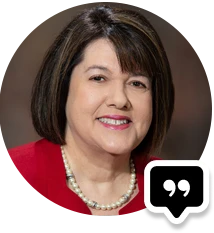
“I did not gain a true understanding of what was possible in the area of education until I went through the Curriculum and Instruction doctoral program. The professors were incredible. They challenged and pushed us, but they were also very supportive. I had a phenomenal team surrounding and supporting me through my doctoral work, which focused on whether the power of professional development in special education would impact perceptions that principals had of students with special needs. It was a very enriching experience.”
Maria Vazquez ’95MEd ’10EdD
Superintendent of Orange County Public Schools
Information Sessions
Ready to take the next step in your academic journey? Join us for an online information session to explore our online doctoral program. You’ll gain valuable insights into the admissions process, discover key features of the curriculum, and speak directly with the program’s faculty, staff and UCF Online success coaches.
“The Curriculum and Instruction Ed.D. program equipped me with the knowledge, skills, and confidence to transition from the classroom into higher-education administration. I am proud to have been awarded first place in the 2020 UCF Three Minute Thesis (3MT®) Competition. I am deeply grateful to the faculty who supported and challenged me throughout the program. Since graduating, I have been promoted into several leadership roles at my institution, including Valencia’s inaugural Presidential Fellow, Director for College Readiness, Interim Dean of Science, and now Assistant Vice President. The same academic programs I once taught within are now the programs I help guide, evaluate, and strengthen to ensure they are effectively serving students and advancing institutional goals.”
Lauren Thomas ’20EdD
Assistant Vice President of Institutional Effectiveness and Planning at Valencia College

